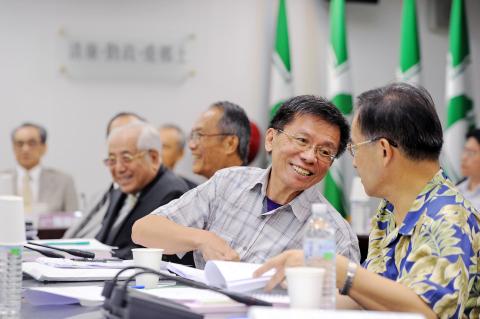The Democratic Progressive Party’s (DPP) first of nine special meetings ended yesterday, during which the party reaffirmed its resolution on Taiwan’s future of 1999 and opposition to the “one China” framework as the core values of the DPP’s China policy.
Party members agreed that the party has to be flexible in its dealings with Beijing to vie for domestic as well as international support.
“The participants agreed that the biggest difference between the DPP and the Chinese Nationalist Party (KMT) is our insistence on safeguarding Taiwan’s sovereignty and protecting the Taiwanese public’s right to determine its own future,” said Cheng Wen-tsang (鄭文燦), spokesperson of the DPP’s China Affairs Committee.

Photo: CNA
About 70 DPP politicians and academics attended the two-hour closed-door meeting, the first of nine on the DPP’s China policy, and engaged in enthusiastic discussions, Cheng said.
Summing up the discussions, Cheng said participants agreed that domestic support would be the most valuable asset for the party; the party should be confident in dealing with Beijing because more than 70 percent of the public identified themselves as Taiwanese, despite the acceleration of cross-strait engagement in recent years; and some people did benefit from bilateral economic exchanges.
Former deputy foreign minister Michael Kau (高英茂) was quoted as saying that the DPP should be patient and flexible in formulating its China policy, since the endgame solution of the cross-strait political dilemma may not arise in this or the next generation.
Therefore, the short to medium-term goal for the DPP should be pursuing peace and lowering tensions across the Strait, Cheng quoted Kau as saying.
Central Executive Committee member Hung Chi-kune (洪智坤) said after the meeting that participants appeared to be split on the party’s general strategy on cross-strait relations, with some favoring an ambiguous approach while others, most of whom are independence supporters, insisting that the strategy should be clear.
However, most attention was directed toward two participants — former premier Frank Hsieh (謝長廷), who had returned from a cross-strait forum in Hong Kong on Wednesday, and former DPP lawmaker Shen Fu-hsiung (沈富雄), whose political view has been leaning toward the pan-blue camp since quitting the DPP.
Cheng and National Dong Hwa University professor Shih Cheng-feng (施正鋒) said that participants who held different views from Hsieh’s refrained from directly criticizing the former premier, who left the meeting early.
However, Shih did pose a question about Hsieh’s remarks in Hong Kong about Taiwan and China as a “community of destiny” and said the remarks were “inappropriate” because China still holds hostility and territorial ambition against Taiwan, they added.
The DPP’s China policy should be acceptable to all Taiwanese, tolerated by Beijing and differ from the KMT’s China policy, Shen said, adding that the KMT’s recent recognition of the “one China” framework proved that its initiatives of the so-called “1992 consensus” and “one China with different interpretations” never existed.
The second meeting, which is to focus on how the DPP should handle the “1992 consensus,” is scheduled to take place on July 25.

A strong continental cold air mass is to bring pollutants to Taiwan from tomorrow, the Ministry of Environment said today, as it issued an “orange” air quality alert for most of the country. All of Taiwan except for Hualien and Taitung counties is to be under an “orange” air quality alert tomorrow, indicating air quality that is unhealthy for sensitive groups. In China, areas from Shandong to Shanghai have been enveloped in haze since Saturday, the ministry said in a news release. Yesterday, hourly concentrations of PM2.5 in these areas ranged from 65 to 160 micrograms per cubic meter (mg/m³), and pollutants were

Taiwan’s armed forces have established response protocols for a wide range of sudden contingencies, including the “Wan Chun Plan” to protect the head of state, the Ministry of Defense (MND) said today. After US President Donald Trump on Saturday launched a series of airstrikes in Venezuela and kidnapped Venezuelan President Nicolas Maduro, concerns have been raised as to whether China would launch a similar “decapitation strike” on Taiwan. The armed forces regularly coordinate with relevant agencies and practice drills to ensure preparedness for a wide range of scenarios, Vice Minister of National Defense Hsu Szu-chien (徐斯儉) told reporters before a

EVA Airways on Saturday said that it had suspended a pilot and opened an investigation after he allegedly lost his temper and punched the first officer several times as their plane was taxiing before takeoff at Los Angeles International Airport. According to a report published on Thursday by The Reporter, the incident occurred after the flight’s Malaysian first officer tried to warn the Taiwanese pilot, surnamed Wen (文), that he was taxiing faster than the speed limit of 30 knots (55.6kph). After alerting the pilot several times without response, the first officer manually applied the brakes in accordance with standard operating

NOT AN OPENING: Trump’s violation of international law does not affect China’s consideration in attacking Taiwan; Beijing lacks capability, not precedent, an official said Taiwanese officials see the US’ capture of the president of Venezuela as a powerful deterrent to Beijing’s aggression and a timely reminder of the US’ ability to defeat militaries equipped with Chinese-made weapons. The strikes that toppled Venezuelan President Nicolas Maduro signaled to authoritarian leaders, including Chinese President Xi Jinping (習近平), US President Donald Trump’s willingness to use military might for international affairs core to US interests, one senior official in Taipei’s security circle said. That reassured Taiwan, the person said. Taipei has also dismissed the idea that Trump’s apparent violation of international law could embolden Beijing, said the official, who was not